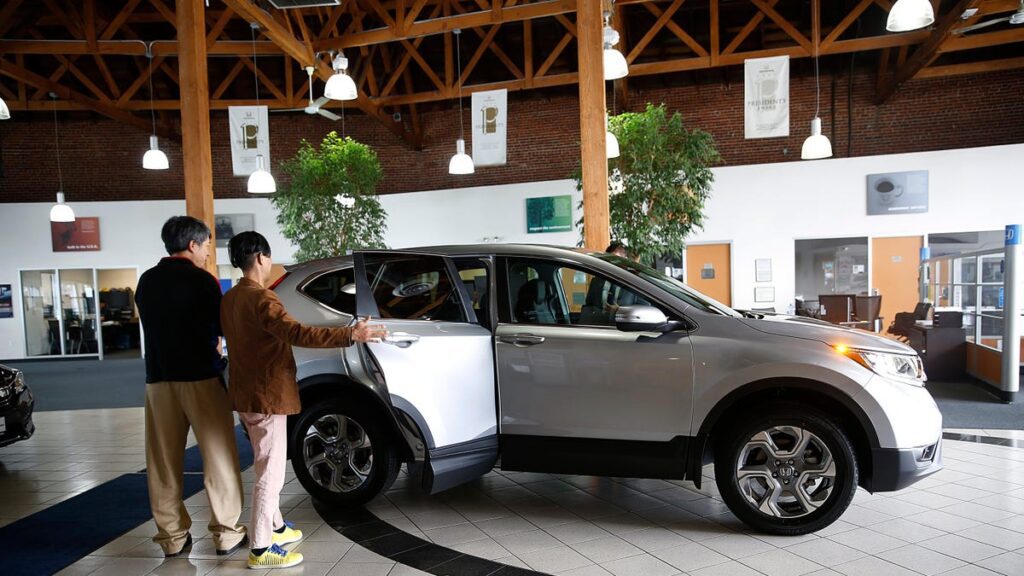That New Car Isn't Yours Just Yet

Image: Liz Hafalia (AP)
Buying a new vehicle is exciting. Most people think that once they sign their name on the dotted line — they can grab the keys and leave the dealer with everything squared away. For some new car buyers, it’s much more complicated than that, as NPR highlighted in a recent story on a dealer practice known as “yo-yoing.”
Essentially a dealer yo-yo — the dealer I was employed at called it puppy-dogging for some reason — is when the dealer let’s you know you’re approved, and allows you to sign, pay for, and leave with the car before you are really approved. You’ve filled out the paperwork, applied for financing, paid the downpayment, signed some documents and then are given the keys to leave in what you believe is your new ride.
But a week or so later, the dealer calls you saying that you, in fact, haven’t been approved. Depending on the dealer, one of two things will happen: they’ll tell you to bring the car back and they’ll either return your downpayment, or they’ll say you need to agree to higher financing terms. Any way you go about the situation sucks — you’ll either be without a car or paying substantially more than you originally agreed to.
This is what happened to Courtney and Darren Johnson in Florida. The couple were new parents and wanted a family car, so they went and purchased a Hyundai SUV from Greenway Hyundai Orlando. Three weeks after their purchase, the Johnsons received a call from the dealer’s finance manager. From NPR:
I received a phone call from the finance manager of the dealership,” Darren Johnson says. The manager told them the financing for the car had fallen through and if the couple wanted to keep it, they had to come back and sign a contract with different terms.
“I was kind of confused,” Johnson says. “I thought this was a legally binding contract. … We’ve had this vehicle at home. What do you mean it’s not financed?”
G/O Media may get a commission

Grow those luscious locks back
This proprietary, prescription-grade topical Finasteride is proven to regrow hair in just a few months.
Thinking something was afoot, the Johnsons ignored the dealer. But the dealer retaliated and sent a tow truck to repossess the SUV. The couple then tried to contact the dealer to get their vehicle back, but the dealership ignored their calls. In the NPR story, the Johnsons’ fate landed them with a year of no car, and asking friends for rides to work and appointments.
Different states have different notification timeframe requirements for dealers. In Maryland, a dealer has just four days to notify a customer if they’re approved or not; in Florida, I couldn’t pin down exactly how long a dealer has; in California, it’s just over 2 weeks.
This also highlights the importance of reading contracts before you sign them. Most of these sales contracts have language in them that says that the dealer can pull this kind of stunt; that sales aren’t final and that the dealer can cancel everything if financing cannot be secured. And it happens more often than you think. Attorneys from across the country spoke to NPR, and of the 40 attorneys they spoke with, they said that they had received over 900 calls regarding this dealer tactic. In most cases, dealers often end up screwing over customers, either with high loan terms or lying to them about not being able to return customer trade-ins.
So, why would a dealer do this? Greed. Dealers don’t want you to leave without buying something the day you set foot on their dealer lot. Many will work a deal and shove the paperwork through finance to whatever company will take it, and for them, on the dealer’s end, everything is done. They’ll get that commission whether financing for the customer was approved or not. Sometimes, it’s done as a tactic to get more money out of a customer, hence the higher financing rates if they’re told they have to bring the vehicle back.
But the government is watching. At the behest of 18 state attorney generals, the Federal Trade Commission is drafting up new rules to stop this practice. Under this proposed rule change, the FTC would prohibit “dealers from misrepresenting when the transaction is final or binding on all parties and from making misrepresentations about keeping cash down payments or trade-in vehicles, charging fees, or initiating legal process or any action if a transaction is not finalized or if the consumer does not wish to engage in a transaction.”
Not everyone believes federal intervention is necessary though, because dealers carry on transactions like this all of the time with no issue. It’s honestly their reputation, and not the customers reputation, happiness or well-being, that they need to protect. From NPR:
But Paul Metrey with the National Automobile Dealers Association says the FTC doesn’t need to change the rules at the federal level. He says the vast majority of car sales go through with no incident. “You have tens of millions of transactions where this happens all the time,” Metrey says, even when the sales contract gives the dealer the right to cancel it later.
So he says there’s nothing wrong with contracts that give dealers the right to cancel after the fact. He says he doesn’t have data on problems with yo-yo sales but that it seems to him that it’s rare that the original terms don’t work and a car buyer needs to be called back.
“That’s a situation that you want to avoid,” he says, because if the buyer walks away, the dealer gets stuck with a car with more mileage on it making it worth less. It’s a headache for everybody involved.
“Perhaps most significantly, you have an unhappy customer,” Metrey says. “The reputation of the dealership is key.”
Those unhappy customers walk away losing a lot more, much like the Johnsons did. The couple not only had no vehicle for a year, but didn’t get their trade-in vehicle back either. The failed financing didn’t cover the trade-in’s loan either, so they were also stuck paying that off. They would eventually dip into their retirement savings to pay off that bill. In the end, the Johnsons got a better ending to their story. After finding an attorney to take their case, they sued Greenway Hyundai Orlando, and won $225,000 in arbitration.






